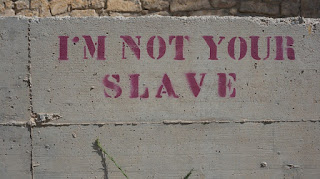 |
Over the next five days, I'll post and blog about how this
works and what you can do to leave, heal and get into a better place.
Here's the first one: "Do I have a problem?"
When you are right in the middle of things, it can be hard
to get perspective. Are you moody? Or fighting all the time?
It may be that you're just going through a rough patch.
However, if you are dealing with an abuser, then the methods they use to
control you will create a kind of mental fog that prevents you from seeing
what's going on.
So, if you're not sure, here's a short list of questions to
ask.
·
Do you have to report on every single detail of
your day?
·
Do you have to hide information about your day,
like who you talked to, because they'll get mad at you?
·
Do you feel anxious if you get a call or text
and you can't reply instantly?
·
Before you meet up, do you check to see what
you're wearing and practice what you'll say – because they'll get mad at you if
you mess up?
·
Is it too much trouble to go out with your
friends because of the epic bitching and questioning during and after?
·
Are you frightened of switching off your phone?
If the answer to one of those questions is yes, it suggests
your partner is abusive.
Heads-Up: nobody has the right to control you. It's not
love; it's abuse.
If you can say no to all the questions above, have a look at
exactly where you are sad or arguing. Common causes for trouble include: not
being open in your communication, having different goals and needs, and having
another hidden issue that's pushing on your relationship. Whatever it is, talking
it out should help.
Note: be prepared that if your relationship is new (say less
than 2 years) or has never been too hot, then being sad/quarrelling etc a lot may
simply mean that you're not a match. That's sad but at least you know and can
move on to find happiness.
If you're saying 😱😱😱 "That's
me!" then do get help. If you're in physical danger, too: leave now. Please don't be
a statistic.
In this series:
Understanding emotional abuse and getting out of it. Part 1, "How can I tell if I am in an abusive relationship?"
Understanding emotional abuse and getting out of it. Part 2 "How did I get into this?"
Understanding emotional abuse and getting out of it. Part 3 "I'm desperate but I can't leave." Examining the tactics abusers use to completely control you.
Understanding emotional abuse and getting out of it. Part 4 "Will therapy fix my abusive relationship?"
Understanding emotional abuse and getting out of it. Part 5 "How to get out of an abusive relationship and get your mojo back."
In this series:
Understanding emotional abuse and getting out of it. Part 1, "How can I tell if I am in an abusive relationship?"
Understanding emotional abuse and getting out of it. Part 2 "How did I get into this?"
Understanding emotional abuse and getting out of it. Part 3 "I'm desperate but I can't leave." Examining the tactics abusers use to completely control you.
Understanding emotional abuse and getting out of it. Part 4 "Will therapy fix my abusive relationship?"
Understanding emotional abuse and getting out of it. Part 5 "How to get out of an abusive relationship and get your mojo back."
NOTE: Image by cocoparisienne




